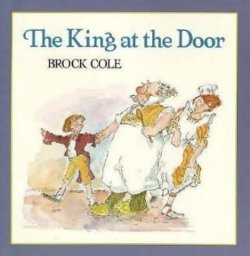Gareth B. Matthews

Review of The King at the Door by Brock Cole (Garden City, NY: Doubleday, 1979). Originally published in Thinking: The Journal of Philosophy for Children 14(1): 1.
The innkeeper’s servant boy, Little Baggit, announced the arrival at the inn of the King. The innkeeper, his wife, and the servant girl all rushed to the window to see him. But all they saw was an old man in a patched shirt, sitting on a bench by the front door.
“That old beggar?” sneered the innkeeper, “if he’s the King, where’s his crown?”
“He left it at the palace,” explained Little Baggit; “but he’s the King all right, he told me so.”
The innkeeper was unimpressed.
“And what does His Majesty desire?” he inquired with mock concern.
“He wants a glass of wine,” replied Little Baggit simply; “he’s tired and thirsty.”
“And how will he pay?” asked the innkeeper, skeptically; “I suppose he’s left his bags of gold at the palace too.”
“That’s right,” admitted Little Baggit; “but he’ll send the money tomorrow by royal coach.”
Contemptuously, the innkeeper sent out dishwater to the old man, rather than the wine the old man had asked for. Little Baggit returned to report that the King didn’t want to drink the dishwater. Little Baggit had given him his own ration of ale instead.
“And I suppose he’d now like a bit to eat,” snarled the innkeeper.
“How did you guess?” replied Little Baggit, innocently. The innkeeper sent the old man the dog’s dinner. Little Baggit returned to report that the King didn’t want the dog’s dinner but that the King had happily eaten the loaf Baggit had planned to eat himself.
“Doesn’t the King want anything else?” asked the innkeeper.
“Yes, he wants a hat to shade his eyes from the sun,” replied Little Baggit.
The innkeeper sent out a cooking pot, to be used as a hat.
Little Baggit returned with the news that the King had not wanted to put the cooking pot on his head, but had happily accepted the offer of Little Baggit’s own hat to shade his eyes.
When the old man asked for a coat, the innkeeper sent out the rags his dog slept on. When the old man rejected the rags, Little Baggit offered him his own coat instead.
When the old man asked for a horse, the innkeeper offered him a sow, which he refused. But Little Baggit gave him his own donkey to ride back to the palace.
“I hope the King appreciates your generosity,” said the innkeeper bitingly.
“Yes, he does,” reported Little Baggit; “he wants me to come live with him in the palace.”
“And I suppose he’ll be sending a royal coach to come pick you up,” said the innkeeper icily.
“Yes, he will,” said Little Baggit. And, sure enough, the next day, the Royal Coach arrived and took Little Baggit to the palace.
This is a delightful story of naive and unquestioning generosity versus jaded cynicism. We readers naturally identify with Little Baggit in his open-hearted, if gullible, display of friendship and we naturally hope that Baggit will be rewarded and the innkeeper humiliated. And that, of course, is just what happens.
But what about real life? Most of us would be unlikely to believe an old man who turned up at our doorstep and claimed to be Napoleon or Jesus Christ. But suppose he said he was a college president, or a senator, or the CEO of IBM. Would we call the police? Or just ignore him? Or would we give him a hot meal and listen to his story?
My own father was one of the most trusting people I have ever known. I can still hear him repeating what others claimed about themselves with a credulity that embarrassed other members of our family. We needed my mother’s shrewdness to make it through the Great Depression.
Or did we? I’m not sure. Everyone knew that my father was himself as trustworthy as he was trusting of other people. He wouldn’t have known how to deceive anyone, about anything. And sometimes, not always, but sometimes, people he had trusted, against the odds, sent the “royal coach” to help him and his family out.
An Aristotelian might suggest that what we need in human character is some sort of “golden mean” between the trusting gullibility of Little Baggit and the cynical shrewdness of the innkeeper. But I’m not sure that that is right.
Aristotle does seem to have thought that there is but a single ideal of human excellence—one optimal configuration of virtues, each expressing a mean between excess and defect. But I’m inclined to think we should allow for several different and mutually incompatible clusters of human virtues, each of which might embody in its own way a genuine moral ideal. The sweet innocence of Little Baggit should not be abandoned for the shrewdness of the innkeeper, even for a version of that shrewdness that is tempered by a moderate ration of human compassion.
